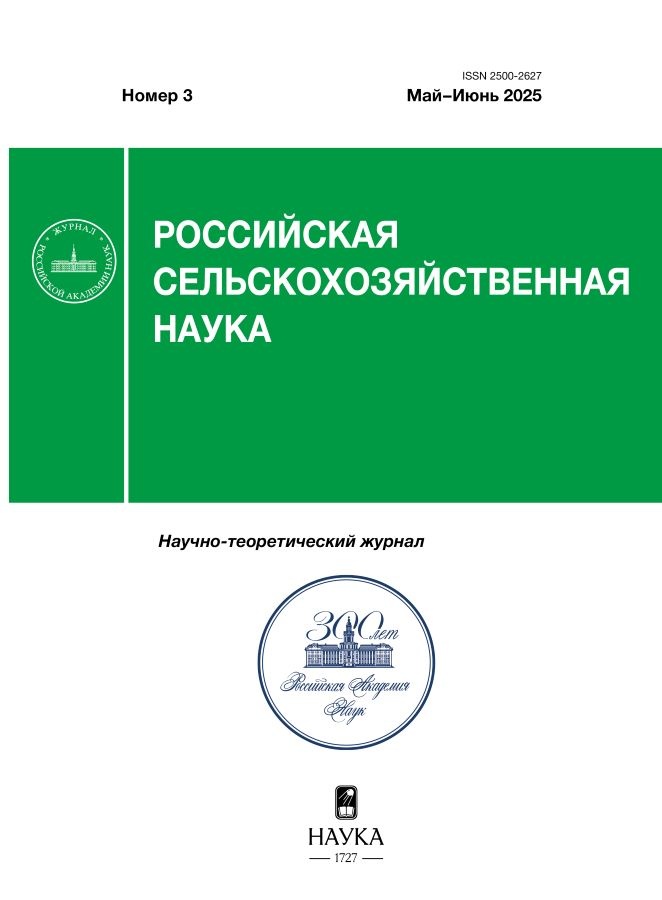Reducing the energy intensity of the process of crushing grape vines with a pick-up-chopper
- Authors: Godzhaev Z.A.1, Likhovskoy V.V.2, Gorobey V.P.2, Moskalevich V.Y.3
-
Affiliations:
- Federal Scientific Agroengineering Center VIM
- All-Russian National Research Institute of Viticulture and Winemaking «Magarach» of the Russian Academy of Sciences
- V.I. Vernadsky Crimean Federal University – Institute «Agrotechnological Academy»
- Issue: No 3 (2025)
- Pages: 54-59
- Section: Mechanization, electrification, automation and digitalization
- URL: https://journals.eco-vector.com/2500-2627/article/view/688056
- DOI: https://doi.org/10.31857/S2500262725030091
- EDN: https://elibrary.ru/FEETSP
- ID: 688056
Cite item
Abstract
The aim of the research is to substantiate the directions of energy consumption reduction and determination of technical and technological indicators of modes of operation of the chopping unit of the grapevine picker-shredder. The calculations of the rotation speed of the chopping knife fixed articulated on the drum, the destructive speed of the knife at the impact impact on the vine are carried out. To find XC and YC coordinates of the centre of gravity C and moment of inertia J of the knife, its 3D-model was created in the Compass-3D program. At the distance from the axis of rotation O of the drum to the axis of rotation O1 of the knife r = 0.05 m the knife can carry out up to 10 cuts of the vine with a diameter of 9.3 mm per one revolution of the drum, and at r = 0.1 m – up to 18 cuts. The obtained regularities were used in the preparation of a mock-up model of the machine for production selection and chopping of vines in 2023–2024. in the inter-row young and fruit-bearing vineyards of Cabernet Sauvignon and Merlot varieties with a width of 3 m in the conditions of the Republic of Crimea in the chopper unit with the drum radius (R = 0.52 m), the mass of the hammer (m = 0.5 kg), length (L = 0.10 m), the number of hammers (k = 32 pcs.), the number of contradictory grids (2 pcs.), the width of the drum (1.5 m). Optimal mode parameters of the machine: pickup shaft speed – 400 rpm, shredding drum speed – 2100 rpm, machine speed – 1,2 m/s, technological clearance for pickup beats – 30…60 mm, technological clearance for shredder knives – 150…200 mm. Completeness of vine picking was 95 % with an average length of shredded clippings of 8.0 cm. The average length of shredded clippings in the 3 m wide row spacing was 80 mm with the completeness of vine picking of 95 %. The productivity of the machine increased by 1.4 times and the energy consumption of the shredding process decreased by 1.1 times.
Keywords
Full Text
About the authors
Z. A. Godzhaev
Federal Scientific Agroengineering Center VIM
Author for correspondence.
Email: fic51@mail.ru
доктор технических наук, член-корреспондент РАН
Russian Federation, MoskvaV. V. Likhovskoy
All-Russian National Research Institute of Viticulture and Winemaking «Magarach» of the Russian Academy of Sciences
Email: fic51@mail.ru
доктор сельскохозяйственных наук
Russian Federation, YaltaV. P. Gorobey
All-Russian National Research Institute of Viticulture and Winemaking «Magarach» of the Russian Academy of Sciences
Email: fic51@mail.ru
доктор технических наук
Russian Federation, YaltaV. Yu. Moskalevich
V.I. Vernadsky Crimean Federal University – Institute «Agrotechnological Academy»
Email: fic51@mail.ru
кандидат технических наук
Russian Federation, Respublika Krym, Simferopol’References
- Апхудов Т. М., Апажев А. К. Шекихачев Ю. А. Математическое моделирование процесса измельчения плодовых ветвей роторным измельчителем // Техника и оборудование для села. 2019. № 9(267). С. 21–24. doi: 10.33267/2072-9642-2019-9-21-24.
- Брагинец С. В., Бахчевников О. Н., Алферов А. С. Теоретические исследования измельчителя стебельчатых кормов // Инженерные технологии и системы. 2021. Том 31, № 4. С. 591–608.
- Гулевский В. А., Вертий А. А. Усовершенствование технологии измельчения грубых стебельчатых кормов измельчителем с шарнирно подвешенными комбинированными ножами // Вестник Воронежского государственного аграрного университета. 2019. Т. 12. № 1. С. 73–81. doi: 10.17238/issn2071-2243.2019.1.73.
- Гулевский В. А., Вертий А. А. Математическое моделирование работы измельчителя кормов // Вестник Воронежского государственного аграрного университета. 2018. № 3. С. 120–128. doi: 10.17238/issn2071-2243.2018.3.120.
- Скориков Н. А., Бейбулатов М. Р., Мишунова Л. А. Эколого-экономические и агрономические аспекты утилизации обрезков виноградной лозы // Ученые записки Крымского федерального университета им. В. И. Вернадского. Экономика и управление. 2016. Т. 2(68). № 2. С. 123–131.
- Модернизация подборщика-измельчителя виноградной лозы / В. П. Горобей, С. С. Старчиков, Н. А. Скориков и др. // Известия сельскохозяйственной науки Тавриды. 2022. № 29 (192). С. 147–158.
- Резник Н. Е. Теория резания лезвием и основы расчета режущих аппаратов. М.: Машиностроение, 1975. 311 с.
- Бейбулатов М. Р., Скориков Н. А., Соболевский И. В. Характеристика и физико-механические свойства виноградной лозы // Виноградарство и виноделие. Сб. научн. тр. НИИВиВ «Магарач». 2007. № 37. С. 55–59.
Supplementary files















